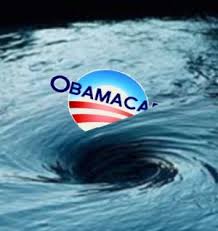Overturning Obamacare and the Death Spiral Peril
< < Go Back
A mere seven words located within the Affordable Care Act (ACA) could be enough to wreck the United States’ health insurance market. King v. Burwell is the most recent Supreme Court case disputing the provisions of the ACA, usually referred to as Obamacare. The case is a clash over whether federal or state healthcare exchanges should distribute ACA subsidies, which take the form of tax credits. The plaintiffs argue for a literal interpretation of the legislation; individuals eligible for ACA subsidies can only receive them “through an exchange established through the state.”
Because many states never built an exchange, their numerous residents rely on the federal exchange located at healthcare.gov in order to receive their subsidies. States were given the choice to opt out of building an exchange after the conclusion of NFIB v. Sebelius, another case that contested the ACA three years ago. While most of the ACA’s main provisions were defended, the Court’s majority decided that pressuring states to expand Medicaid and build an exchange infringed upon state rights.
If the Supreme Court rules in favor of King and agrees with the literal reading of the text, people who depend on the federal exchange would lose their subsidies. The obvious effect would be an increase in the number of uninsured. The indirect effect of losing subsidies would be rising premiums and the possible collapse of health insurance markets in states that rely on the federal exchange. These consequences should be deliberated carefully and not rest on a single line in an act that was originally 1500 pages long.
The Urban Institute, a liberal think-tank in Washington, D.C., estimates that 8.2 million people will become uninsured if they cannot receive subsidies, causing uninsurance rates to increase to 13%. The Rand Corporation, a more conservative think-tank, estimates that 9.6 million people will drop their coverage. A decision in favor of King would undermine one of the ACA’s original goals, which was to reduce the number of uninsured Americans.
The rising numbers of the uninsured is not the only consequence. Another concern is the threat of a death spiral in insurance markets. A death spiral occurs when the only people left in the exchanges are the unhealthy who face very high premiums.
These premiums will then become too high for the next group of people, who are healthy enough that the new premium is a burden. When they leave the insurance market, the risk within the pool increases again, which leads to spiraling, higher premiums.
The thirteen states and D.C. that have exchanges will not be affected, if the court rules in favor of King. The concern is centered on the thirty-seven states, home to 66% of the U.S. population, which had been given a pass on building an exchange will face higher uninsurance rates, rising premiums and a possible market failure. These states are dependent on the court ruling to be delivered this June, which has been more focused on text interpretation than possible economic problems.
During the case’s oral argument that took place on March 4th, only Justice Sotomayor argued that the death spiral is a threat. Although courts are constrained by the Constitution and interpretations of legal precedent, less discussion should be centered around whether “through an exchange established through the state” should be read literally, and more on the economic impacts of the final ruling. It is imprudent to damage health insurance markets within thirty-seven states and affect people’s access to healthcare because of seven words.
More From The Huffington Post:




